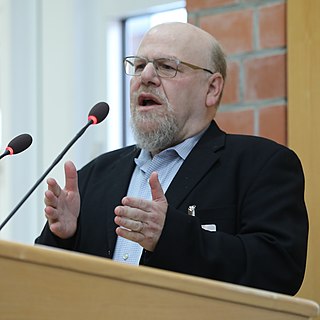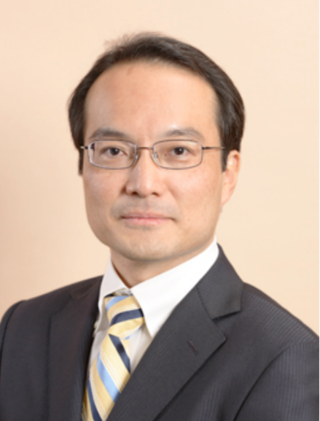Roger Carl Schank was an American artificial intelligence theorist, cognitive psychologist, learning scientist, educational reformer, and entrepreneur. Beginning in the late 1960s, he pioneered conceptual dependency theory and case-based reasoning, both of which challenged cognitivist views of memory and reasoning. He began his career teaching at Yale University and Stanford University. In 1989, Schank was granted $30 million in a ten-year commitment to his research and development by Andersen Consulting, through which he founded the Institute for the Learning Sciences (ILS) at Northwestern University in Chicago.
The belief–desire–intention software model (BDI) is a software model developed for programming intelligent agents. Superficially characterized by the implementation of an agent's beliefs, desires and intentions, it actually uses these concepts to solve a particular problem in agent programming. In essence, it provides a mechanism for separating the activity of selecting a plan from the execution of currently active plans. Consequently, BDI agents are able to balance the time spent on deliberating about plans and executing those plans. A third activity, creating the plans in the first place (planning), is not within the scope of the model, and is left to the system designer and programmer.

James Alexander Hendler is an artificial intelligence researcher at Rensselaer Polytechnic Institute, United States, and one of the originators of the Semantic Web. He is a Fellow of the National Academy of Public Administration.
In artificial intelligence, a procedural reasoning system (PRS) is a framework for constructing real-time reasoning systems that can perform complex tasks in dynamic environments. It is based on the notion of a rational agent or intelligent agent using the belief–desire–intention software model.
Ekaterini Panagiotou Sycara is a Greek computer scientist. She is an Edward Fredkin Research Professor of Robotics in the Robotics Institute, School of Computer Science at Carnegie Mellon University internationally known for her research in artificial intelligence, particularly in the fields of negotiation, autonomous agents and multi-agent systems. She directs the Advanced Agent-Robotics Technology Lab at Robotics Institute, Carnegie Mellon University. She also serves as academic advisor for PhD students at both Robotics Institute and Tepper School of Business.
James Frederick Allen is an American computational linguist recognized for his contributions to temporal logic, in particular Allen's interval algebra. He is interested in knowledge representation, commonsense reasoning, and natural language understanding, believing that "deep language understanding can only currently be achieved by significant hand-engineering of semantically-rich formalisms coupled with statistical preferences". He is the John H. Dessaurer Professor of Computer Science at the University of Rochester.
AgentSpeak is an agent-oriented programming language. It is based on logic programming and the belief–desire–intention software model (BDI) architecture for (cognitive) autonomous agents. The language was originally called AgentSpeak(L), but became more popular as AgentSpeak, a term that is also used to refer to the variants of the original language.
JACK Intelligent Agents is a framework in Java for multi-agent system development. JACK Intelligent Agents was built by Agent Oriented Software Pty. Ltd. (AOS) and is a third generation agent platform building on the experiences of the Procedural Reasoning System (PRS) and Distributed Multi-Agent Reasoning System (dMARS). JACK is one of the few multi-agent systems that uses the BDI software model and provides its own Java-based plan language and graphical planning tools.

In Australia, the Australian Artificial Intelligence Institute (Australian AI Institute, AAII, or A2I2) was a government-funded research and development laboratory for investigating and commercializing artificial intelligence (AI), specifically intelligent software agents.
In artificial intelligence, the distributed multi-agent reasoning system (dMARS) was a platform for intelligent software agents developed at the AAII that makes uses of the belief–desire–intention software model (BDI). The design for dMARS was an extension of the intelligent agent cognitive architecture developed at SRI International called procedural reasoning system (PRS). The most recent incarnation of this framework is the JACK Intelligent Agents platform.
The LIDA cognitive architecture attempts to model a broad spectrum of cognition in biological systems, from low-level perception/action to high-level reasoning. Developed primarily by Stan Franklin and colleagues at the University of Memphis, the LIDA architecture is empirically grounded in cognitive science and cognitive neuroscience. It is an extension of IDA, which adds mechanisms for learning. In addition to providing hypotheses to guide further research, the architecture can support control structures for software agents and robots. Providing plausible explanations for many cognitive processes, the LIDA conceptual model is also intended as a tool with which to think about how minds work.
Agent-oriented programming (AOP) is a programming paradigm where the construction of the software is centered on the concept of software agents. In contrast to object-oriented programming which has objects at its core, AOP has externally specified agents at its core. They can be thought of as abstractions of objects. Exchanged messages are interpreted by receiving "agents", in a way specific to its class of agents.
Henry A. Kautz is a computer scientist, Founding Director of Institute for Data Science and Professor at University of Rochester. He is interested in knowledge representation, artificial intelligence, data science and pervasive computing.

Michael John Wooldridge is a professor of computer science at the University of Oxford. His main research interests is in multi-agent systems, and in particular, in the computational theory aspects of rational action in systems composed of multiple self-interested agents. His work is characterised by the use of techniques from computational logic, game theory, and social choice theory.

Carla Pedro Gomes is a Portuguese-American computer scientist and professor at Cornell University. She is the founding Director of the Institute for Computational Sustainability and is noted for her pioneering work in developing computational methods to address challenges in sustainability. She has conducted research in a variety of areas of artificial intelligence and computer science, including constraint reasoning, mathematical optimization, and randomization techniques for exact search methods, algorithm selection, multi-agent systems, and game theory. Her work in computational sustainability includes ecological conservation, rural resource mapping, and pattern recognition for material science.

Christian Guttmann is an entrepreneur, business executive and scientist in Artificial Intelligence, Machine Learning and Data Science. He has three citizenships. He is currently the vice president in Engineering and Artificial Intelligence at Pegasystems, and leads the AI research and development including the development of Large Language Models and Generative AI. He is an adjunct associate professor at the University of New South Wales, Australia and Adjunct researcher at the Karolinska Institute, Sweden. Guttmann has edited and authored 7 books, over 50 publications and 4 patents in the field of Artificial Intelligence. He is a keynote speaker at international events, including the International Council for Information Technology (ICA) in Government Administration and CeBIT and is cited by MIT Sloan Management review and Bloomberg.
Human-Robot Collaboration is the study of collaborative processes in human and robot agents work together to achieve shared goals. Many new applications for robots require them to work alongside people as capable members of human-robot teams. These include robots for homes, hospitals, and offices, space exploration and manufacturing. Human-Robot Collaboration (HRC) is an interdisciplinary research area comprising classical robotics, human-computer interaction, artificial intelligence, process design, layout planning, ergonomics, cognitive sciences, and psychology.
Michael Genesereth is an American logician and computer scientist, who is most known for his work on computational logic and applications of that work in enterprise management, computational law, and general game playing. Genesereth is professor in the Computer Science Department at Stanford University and a professor by courtesy in the Stanford Law School. His 1987 textbook on Logical Foundations of Artificial Intelligence remains one of the key references on symbolic artificial intelligence. He is the author of the influential Game Description Language (GDL) and Knowledge Interchange Format (KIF), the latter of which led to the ISO Common Logic standard.
GOLOG is a high-level logic programming language for the specification and execution of complex actions in dynamical domains. It is based on the situation calculus. It is a first-order logical language for reasoning about action and change. GOLOG was developed at the University of Toronto.

Takayuki Ito is a Japanese computer scientist who specialized in the fields of artificial intelligence and multi-agent systems. He worked as assistant professor in the computer science department of Japan Advanced Institute of Science and Technology from 2001 until 2003, served as associate professor in the computer science department of Nagoya Institute of Technology (2006–2014), worked as full professor in the computer science department of Nagoya Institute of Technology (2014–2020). He also served as chair of the department (2016–2018)and also director the NITech Artificial Intelligence Research Center at Nagoya Institute of Technology.





